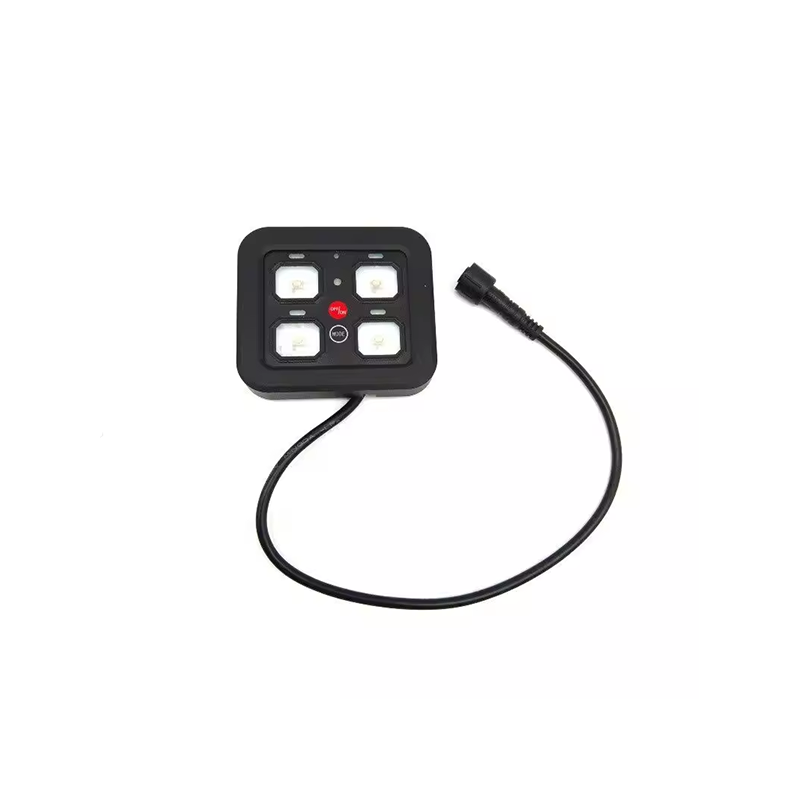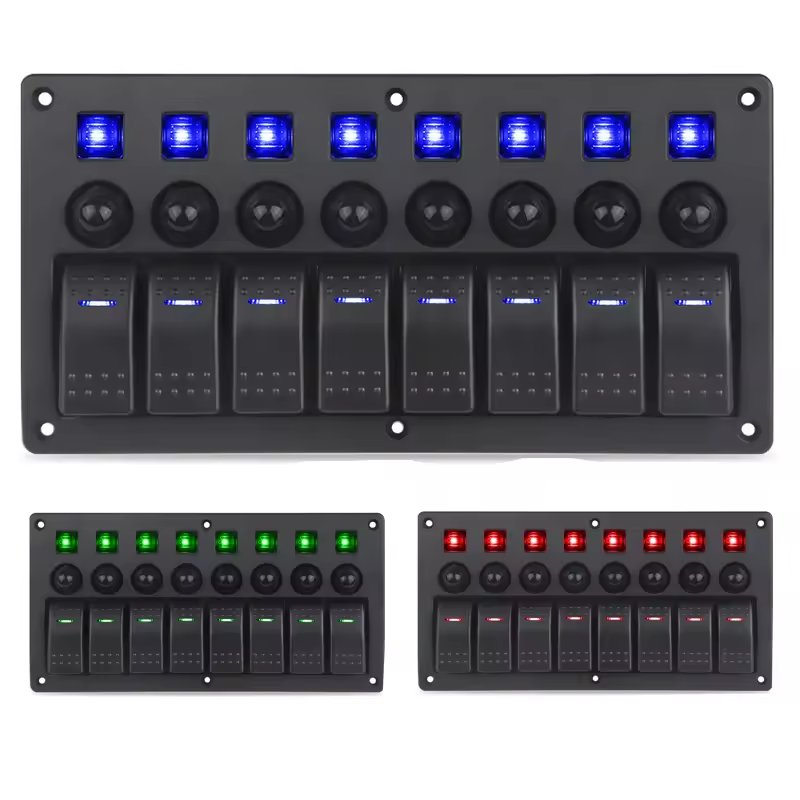Jan 16,2025
0
A fuse box is crucial for safeguarding electrical circuits in vehicles and boats. It functions as a protective mechanism to prevent circuits from overload. The basic components of a fuse box include fuses, which are devices that melt or break when the current exceeds a safe level. This interruption in electrical flow stops potentially damaging overcurrents, thereby protecting the vehicle or boat's electrical systems from overheating and fire hazards. Fuse boxes usually have several fuse slots that correspond to different circuits, each containing a fuse with the appropriate amperage rating to ensure proper protection.
In electrical systems of cars and boats, fuse boxes play a vital role in maintaining safety. By preventing electrical overloads, they help avert fire risks and ensure that the electrical systems function correctly. For instance, if a car's lighting circuit experiences a spike in electricity, the corresponding fuse will blow and cut off power, preventing damage and potential fire. Similarly, in boats, where electrical systems are exposed to moisture, the fuse box is essential to prevent short circuits and other hazards. Thus, fuse boxes are indispensable in ensuring the safety and reliability of electrical systems in vehicles and marine vessels.
Recognizing signs of potential issues with car and boat fuse boxes can prevent serious electrical malfunctions. Some common indicators include flickering lights, unresponsive electrical accessories, or the complete shutdown of power systems. Odd smells or visible scorch marks around the fuse box are also red flags signaling that immediate attention is needed.
If you suspect a blown fuse, troubleshooting is essential to identify and resolve the problem. Follow a step-by-step approach to ensure safety and accuracy. First, visually inspect the fuses for any signs of burning or damage. This might involve checking for a melted or broken filament inside the glass of the fuse. Next, use a multimeter on each fuse to test for electrical continuity and determine which fuse is blown. Replace the compromised fuse with one of the correct amperage to restore the system's functionality. Always refer to the vehicle or boat manual for guidance on fuse ratings and configurations to prevent recurring issues.
Maintaining your car and boat fuse box is key to ensuring longevity and efficient functioning. Regular routine checks should include inspecting for any corrosion on connections, as corrosion can impede electrical flow and lead to malfunction. Any signs of rust or whitish deposits should be addressed immediately. Ensure that connections are clean and secure; loose connections may cause intermittent electrical problems or even result in overheating. Periodically tightening screws and checking that wire connections are firm will help prevent these issues.
For effective maintenance, cleaning and inspecting fuse holders is crucial. Use a non-abrasive cleaner to wipe down the fuse holders and ensure they are free from debris and moisture. The best practice is to switch off the power source before undertaking any cleaning to avoid electrical hazards. Tools such as small brushes or pressurized air can be beneficial in removing dust and ensuring all contacts are clear of obstructions. Regular maintenance like this can greatly enhance the reliability and safety of your electric system on both cars and boats.
When upgrading your fuse box system, it's essential to select the right components that meet your vehicle's needs. Key criteria include assessing the vehicle type, power requirements, and any anticipated future expansions. For instance, a high-performance vehicle may demand a more robust fuse box to accommodate multiple high-amp circuits. Additionally, consider the size of the current system and how an upgrade might improve efficiency and safety. Future expansion capabilities can save time and cost when additional systems are introduced to your vehicle or boat.
The 4 Gang Button Switch Pod System is a notable option for those considering an upgrade. Crafted from durable aluminum, this panel offers a host of features, including an auto-dimmable backlight for visibility in all lighting conditions and comprehensive circuit protection against overloads and overheating. It's designed for easy installation, whether for automotive upgrades or managing home appliances. Market testimonials frequently highlight its reliability and safety.

Another excellent option is the 8 Gang Rocker Switch Panel, which is highly suitable for marine applications. Its usability and compatibility with current systems make it a top choice for boat owners seeking greater control over electrical devices. Made from resilient materials, it operates well in extreme temperatures and offers multiple safety protections like short circuit and overload protection. Its eight individual switches provide comprehensive management over a range of appliances, proving its utility for both marine and land vehicles.

By upgrading to a more sophisticated fuse box system like these, users can ensure not only enhanced safety and reliability but also the flexibility to accommodate expanding technological needs and applications.
Troubleshooting fuse box issues can be a daunting task, especially in complex environments such as marinas and roadside setups. It's crucial to follow a systematic and safe approach while diagnosing problems. Start by ensuring that the power is off to prevent any electrical accidents. Next, inspect the fuse box for any visible signs of damage such as burnt marks or corrosion on the terminals. Use a multimeter to check for voltage continuity across the fuses, which can help identify any blown fuses. In marina scenarios, ensure that the surrounding environment is dry and that you are wearing appropriate safety gear to prevent electrical shocks.
However, not all issues can be resolved with basic DIY troubleshooting, and certain indicators suggest the need for professional assistance. If you consistently experience problems that recur after attempted repairs or notice any signs of severe damage – like persistent tripping of circuits or a burning smell – it is advisable to consult a licensed electrician. These professionals have the necessary tools and expertise to address complex or hazardous situations safely and effectively, ensuring that your electrical systems are both reliable and secure.
Understanding fuse ratings and adhering to safety standards are crucial when dealing with fuse boxes. Fuses are designed to handle specific electrical loads, and using the wrong size or type can lead to overheating or fire hazards. It's critical to follow manufacturer specifications, as they are based on extensive testing and ensure that the electrical system operates safely. Ignoring these can result in significant risks like circuit failures or even electrical fires.
Proper installation and ensuring secure connections are fundamental to preventing electrical failures in fuse boxes. One common mistake is using outdated wiring that doesn't match the current load requirements, leading to inefficiencies or potential hazards. Best practices include double-checking connections to ensure they are tight and secure, using appropriate tools, and consulting professional guidelines. Installing correctly prevents frequent outages and extends the life of the system, ensuring it functions safely and efficiently over time.
Maintaining and troubleshooting your fuse box efficiently requires adhering to best practices to ensure safety and functionality. Routine inspections are paramount, as they help identify issues like worn-out wires or outdated components. Timely replacement of fuses with the correct specifications ensures dependable electrical supply while preventing overheating and potential fire hazards. Incorporating regular cleaning to remove dust and debris also plays a critical role in maintaining optimal performance.
Regular inspections not only safeguard your home but also contribute to electrical efficiency and longevity. Studies indicate that consistent maintenance can decrease electrical malfunctions by up to 30%, enhancing safety and reducing energy costs. Thus, engaging a professional for annual inspections can prevent potential hazards, ensuring that your electrical systems operate seamlessly. By embedding these practices in your maintenance routine, you safeguard your home and ensure the efficiency of your electrical systems.